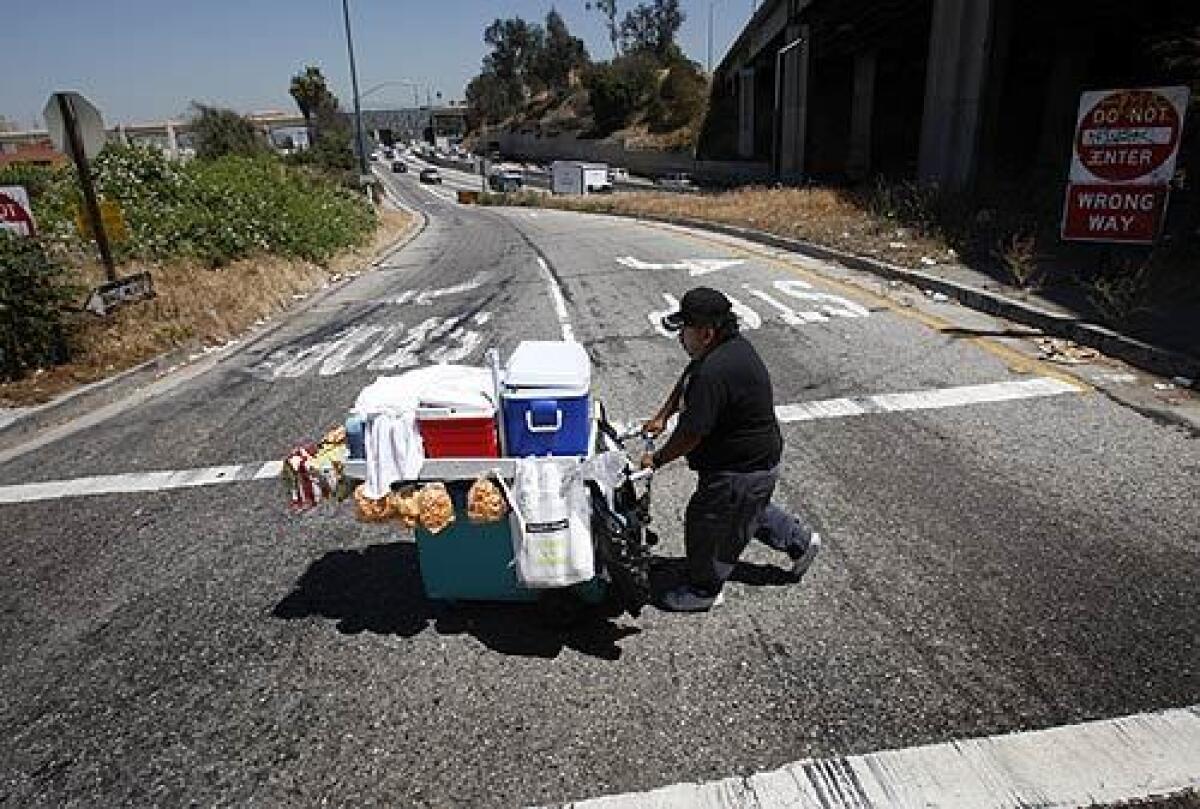Glendale sidewalk vending rules adopted, making vendors non-compliant overnight

- Share via
Sellers of hot dogs, hats and other goods on Glendale sidewalks are now technically in violation of city rules adopted this week that require them to obtain a permit.
A sidewalk vending ordinance adopted 4-0 Tuesday evening by Glendale City Council members went into effect immediately, meaning sellers throughout the city must apply for a permit or face possible fines.
“We’d advise vendors to stop [selling] until they get their permit,” Glendale City Atty. Mike Garcia said after the ordinance was adopted. A permit application costs $295.
Before the city will approve a permit, prospective vendors must undergo a background check and obtain a health permit from L.A. County if they intend to sell food, Garcia added.
No vendors have requested a permit application yet, Glendale city spokeswoman Eliza Papazian said.
A state law that went into effect Jan. 1 prevents cities from banning or criminalizing sidewalk vending, also called street vending. The Safe Sidewalk Vending Act, or SB 946, does allow cities and counties to enact some local regulations.
Several cities, including Los Angeles, Santa Monica, West Hollywood, Newport Beach and Huntington Beach, have already adopted their own sidewalk vending ordinances.
Fines for violating the permitting requirements and operating without a permit are built into the state law. The first violation will result in a fine of $100 or less. A third violation within the same year can jump to $500.
Code and law enforcement officials have the discretion to hand out warnings to vendors in lieu of fines, Garcia said.
Glendale City Council members made haste to adopt the comprehensive local rules before the holiday season, when a modest influx of vendors is expected.
They were written and adopted into what’s known as an emergency ordinance within less than a month.
Permits are just one aspect of Glendale’s ordinance. It details what times and where in the city vendors can operate. Many of the “no vend” zones are in the busiest places in the city, including large swaths of the downtown area.
Vendors are now also required to stay specific distances away from police stations, special events, farmer’s markets, business entrances, bus shelters and each other.
A required distance from schools was increased to 350 feet, up from 200 feet, during the meeting on Tuesday at the suggestion of Councilwoman Paula Devine.
Throughout the process, Councilman Frank Quintero has consistently pointed out the sidewalk vending scene in Glendale is not exactly out of control. There are only a handful of known vendors in the city, including a hot dog seller outside the local nightclub Giggles and a few people who sell trinkets outside the Americana at Brand, he said.
“We have an emergency ordinance, but I see absolutely no emergency,” Quintero said Tuesday evening.
Quintero voted for the ordinance on the condition that a proposed insurance liability requirement be removed. That element was eliminated from the emergency ordinance but will be brought back for consideration at a later date.
Not every city leader agreed with Quintero’s characterization of the situation.
“It might not be a red-flag emergency, but I see it getting worse and worse every day,” said GiGi Garcia, vice president of the Montrose Shopping Park Assn.
A recent wine-focused event in Montrose drew a food truck hoping to draw customers from the gathered crowd, she said. Under the new ordinance, the truck would have to remain 500 feet from what would be considered a special event.
